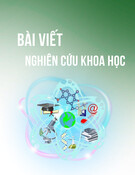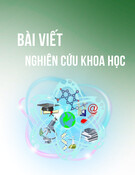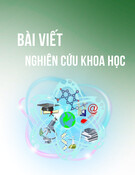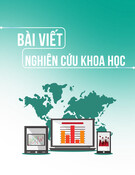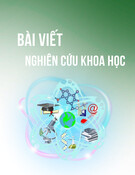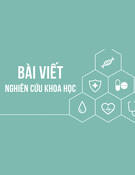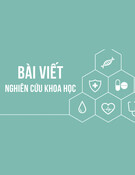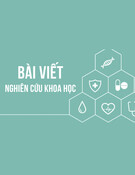
Hue University Journal of Science: Social Sciences and Humanities
ISSN 2588-1213
Vol. 133, No. 6B, 2024, p.p. 95–105, DOI: 10.26459/hueunijssh.v133i6B.7172
ACADEMIC SELF-EFFICACY AND ACADEMIC
SATISFACTION AMONG HUE UNIVERSITY STUDENTS
Ho Thi Truc Quynh *, Pham Thi Thuy Hang, Nguyen Thi Ha
College of Education Sciences, Hue University, 34 Le Loi Str, Hue, Vietnam
* Correspondence to Ho Thi Truc Quynh < httquynh@hueuni.edu.vn >
(Received: April 06, 2023; Accepted: March 26, 2024)
Abstract. This study aims to investigate the level of academic self-efficacy, academic satisfaction, and the
relationship between academic self-efficacy and academic satisfaction among Hue University students. 771
students participated in the questionnaires about academic self-efficacy and academic satisfaction.
Descriptive statistics, correlation analysis, and One-way ANOVA analysis were performed to answer three
research questions. Research results indicate that students have moderate levels of academic self-efficacy
and are basically academically satisfied. Academic self-efficacy is positively correlated with academic
satisfaction. The results of the study supplement the theoretical and practical basis of academic self-
efficacy and academic satisfaction and the relationship between the two factors. The findings of this study
can be used as a basis for developing measures to enhance academic satisfaction among university
students.
Keywords. Academic self-efficacy; academic satisfaction; university students; Hue University.
1. Introduction
According to Bandura, self-efficacy is the term used to describe a person's self-
confidence in their ability to complete a task (Liu, Cheng, Hu, Pan, & Zhao, 2020). A
subcategory of self-efficacy called "academic self-efficacy" pertains to students' assessments of
their own aptitude and their capacity to carry out and accomplish the defined learning
objectives (Bandura, 1978). Academic self-efficacy is one of the most important elements
influencing persistence and academic success among university students (Fakhrou & Habib,
2021). High academic self-efficacy promotes positive personal expectations about learning task
results; conversely, it also reduces the individual's negative experience of the learning task
process (Liu et al., 2020). Previous studies reported that university students had low levels of

Ho Thi Truc Quynh et al Vol. 133, No. 6B, 202
4
96
academic self-efficacy (Altermatt, 2019; Grøtan, Sund, & Bjerkeset, 2019; Odaci, 2011). These
results were found in a sample of Turkish, Norwegian, and Midwestern university students.
Academic satisfaction is the term used to describe the subjective assessment of the entire
educational process, and it is described as a psychological condition that follows from the
affirmation or rejection of students' expectations regarding their academic reality (Ramos et al.,
2015). One of the top satisfaction domains in college students' lives is academic satisfaction
(Lent et al., 2017; Zalazar-Jaime, Moretti, & Medrano, 2022). Several previous studies have
emphasized the importance of academic satisfaction for life satisfaction and well-being
(Garriott, Hudyma, Keene, & Santiago, 2015; Sheu, Mejia, Rigali-Oiler, Primé, & Chong, 2016).
Accordingly, academic satisfaction can increase an individual's level of well-being and life
satisfaction. Previous studies have shown different levels of academic satisfaction among
university students. For example, it is found that students are basically satisfied with their
academic experience at university (Balkis, 2013; Nguyễn Thị Hà et al., 2022; Walter et al., 2020).
However, other research has shown that students' satisfaction with the institution was low
(Walter et al., 2020).
Previous investigations were conducted to determine the association between academic
self-efficacy and academic satisfaction. These investigations involved subjects from various
grade levels and age ranges and were conducted in a variety of settings. In general, previous
studies have revealed that academic self-efficacy is positively correlated with learners' academic
satisfaction (Azila-Gbettor, Mensah, & Abiemo, 2022; Doménech-Betoret, Abellán-Roselló, &
Gómez-Artiga, 2017; Jan, 2015; Koca, Kılıç, & Dadandı, 2023; Ojeda, Flores, & Navarro, 2011).
Factors such as academic motivation (Bedel, 2015; Chau & Cheung, 2018; Lin, Longobardi, &
Bozzato, 2022; Malkoç & Kesen Mutlu, 2018; Naseer & Rafique, 2021; Taheri-Kharameh,
Sharififard, Asayesh, Sepahvandi, & Hoseini, 2018), academic engagement (Abdulwahhab &
Hashim, 2020; Caraway, Tucker, Reinke, & Hall, 2003; El-Sayad, Md Saad, & Thurasamy, 2021;
Huaman, Berona, Rodriguez, & Cordero, 2022; Shin, 2019; Zhen et al., 2017), meaningfulness of
study (Azila-Gbettor et al., 2022), and academic achievement (Hanham, Lee, & Teo, 2021) can
explain the relationship between academic self-efficacy and academic satisfaction.
In Vietnam, except for the study by Đặng Nguyễn Thiên An et al. (2020) on academic self-
efficacy of students at Ho Chi Minh City University of Education and the study by Nguyễn Thị
Hà et al. (2022) on the academic satisfaction of students at Hue University of Education, there
still needs to be studies on self-confidence and learning satisfaction as well as the relationship
between them in university students. This study aims to investigate the level of academic self-
efficacy, the level of academic satisfaction, and the relationship between academic self-efficacy
and academic satisfaction among Hue University students. Therefore, this study aims to answer

Jos.hueuni.edu.vn
Vol. 133, No. 6B, 2024
97
the following three research questions: (1) what is the level of academic self-efficacy of students
at Hue University? (2) What is the level of academic satisfaction of students at Hue University?
and (3) how is academic self-efficacy related to academic satisfaction?
2. Methods
2.1. Participants
The data was collected in February 2023 through an in-person classroom survey. The
number of questionnaires distributed was 1023, the number of questionnaires collected was
1012, and the number of valid questionnaires was 771. The final data included 771 Hue
University students (Mage = 20.20 ± 1.152) participating in this study. The majority of the
research sample was female (76.4%); second-year students accounted for 32.3%; third-year
students accounted for 27.4%; fourth-year students accounted for 40.3%; there were no first-year
students.
2.2. Measurement tools
The General Self-Efficacy Scale (GSE) was developed by Schwarzer and Jerusalem (1995).
The GSE is a self-report scale consisting of 10 items used to measure academic self-efficacy
among Hue University students. The scale is scored on a four-point Likert scale (1 = "not at all
true”, 4 = "exactly true”), with an overall mean score ranging from 1 to 4. Scores greater than 3.5
are considered to be high academic self-efficacy; scores between 2.5 and 3.5 are considered to be
moderate academic self-efficacy; and scores below 2.5 are considered to be low academic self-
efficacy (Schwarzer & Jerusalem, 1995). In this study, α = 0.91.
The Academic Life Satisfaction Scale (ALSS) was developed by Schmitt et al. (2008). The
ALSS is a self-report scale consisting of 5 items used to measure academic satisfaction among
Hue University students. A five-point Likert scale (1 = strongly disagree", 5 = strongly agree")
was used, with the higher the overall mean score indicating the more academically satisfied
students were. In this study, α = 0.92.
2.3. Data Analysis
We used the SPSS 20.0 software package for all data analysis. Descriptive statistics (mean
and standard deviation; number and prevalence) were used with the academic self-efficacy,
academic satisfaction, age, school level, and gender variables. Correlation analysis was
performed to test the linear relationship between academic self-efficacy and academic
satisfaction. A One-way ANOVA analysis was performed to examine the differences in
academic satisfaction scores between students with different academic self-efficacy levels.

Ho Thi Truc Quynh et al Vol. 133, No. 6B, 202
4
98
3. Results
3.1. Academic self-efficacy among Hue University students
Table 1 presents the level of academic self-efficacy among Hue University students.
According to Table 1, the average item score ranged from 2.67 to 3.15. The item "It is easy for me
to stick to my aims and accomplish my goals" has the highest score, and the item " I can usually
handle whatever comes my way" has the lowest score. Overall, Hue University students have a
moderate level of academic self-efficacy (M = 3.03, SD = 0.45 with M < 3.5). While most students
have moderate academic self-efficacy (82.88%), a few have low or high academic self-efficacy
(6.87% and 10.25%).
Table 1. Academic self-efficacy among Hue University students
Item Range M ± SD
1. I can always manage to solve difficult problems if I try
hard enough
1 - 4 3.12 ± 0.61
2. If someone opposes me, I can find the means and
ways to get what I want.
1 – 4 3.01 ± 0.63
3. It is easy for me to stick to my aims and accomplish
my goals.
1 – 4 3.15 ± 0.66
4. I am confident that I could deal efficiently with
unexpected events.
1 – 4 3.00 ± 0.66
5. Thanks to my resourcefulness, I know how to handle
unforeseen situations.
1 – 4 3.01 ± 0.64
6. I can solve most problems if I invest the necessary
effort.
1 – 4 3.10 ± 0.62
7. I can remain calm when facing difficulties because I
can rely on my coping abilities.
1 – 4 3.03 ± 0.66
8. When I am confronted with a problem, I can usually
find several solutions.
1 – 4 3.04 ± 0.59
9. If I am in trouble, I can usually think of a solution 1 – 4 3.06 ± 0.60
10. I can usually handle whatever comes my way. 1 – 4 2.67 ± 0.74

Jos.hueuni.edu.vn
Vol. 133, No. 6B, 2024
99
Academic self-efficacy 1 - 4 3.03 ± 0.45
Group n %
Low academic self-efficacy (
𝑋
< 2.5) 53 6.87
Moderate academic self-efficacy (2.5≤
𝑋
≤ 3.5) 639 82.88
High academic self-efficacy (
𝑋
> 3.5) 79 10.25
3.2. Academic satisfaction among Hue University students
Table 2 presents the level of academic satisfaction among Hue University students.
According to Table 2, the average item score ranged from 3.75 to 4.07. The item "I'm satisfied
with the intelligence of my teachers here" has the highest score, and the item "I'm happy with
the amount I learn in my classes" has the lowest score. Overall, the level of academic satisfaction
among Hue University students was 3.87 (SD = 0.78).
Table 2. Academic satisfaction among Hue University students
Item Range M ± SD
1. All in all, I am satisfied with the education I can get in this
school
1 - 5 3.83 ± 0.89
2. I’m satisfied with the intelligence of my teachers here 1 – 5 4.07 ± 0.88
3. I’m satisfied with the extent to which my education will be
useful for getting future employment
1 – 5 3.83 ± 0.91
4. I’m happy with the amount I learn in my classes 1 – 5 3.75 ± 0.89
5. I’m satisfied with the extent to which attending this school
will have a positive effect on my future career
1 – 5 3.87 ± 0.91
Total 1 - 5 3.87 ± 0.78
3.3. The relationship between academic self-efficacy and academic satisfaction among Hue
University students
Table 3 presents the level of academic satisfaction among students with different levels of
academic self-efficacy. The one-way ANOVA analysis of variance showed that there was a
difference in academic satisfaction among students with high, moderate, and low academic self-




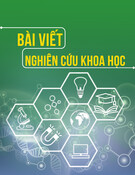


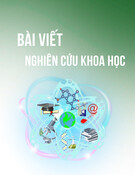


![Câu hỏi ôn tập môn Tâm lý học giáo dục [chuẩn nhất]](https://cdn.tailieu.vn/images/document/thumbnail/2025/20250710/kimphuong1001/135x160/59611752136982.jpg)
